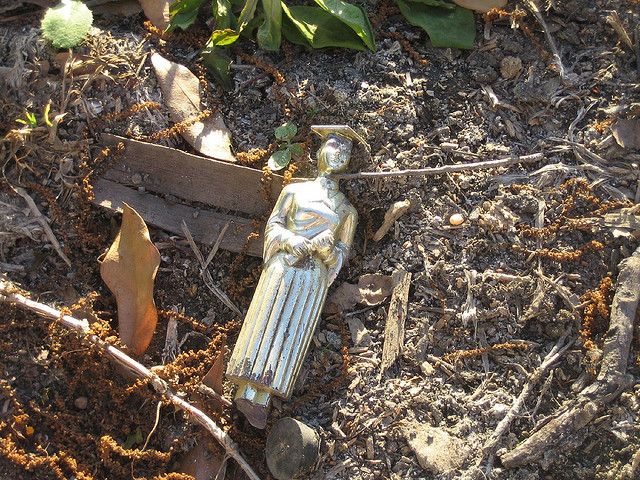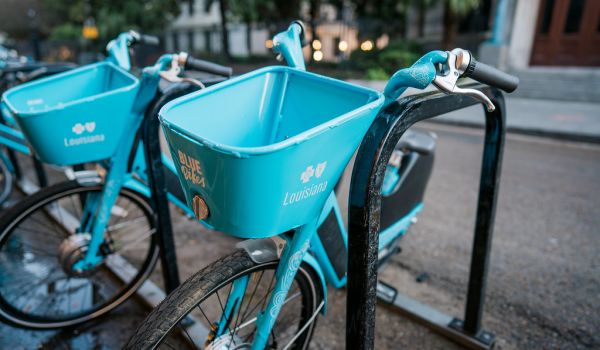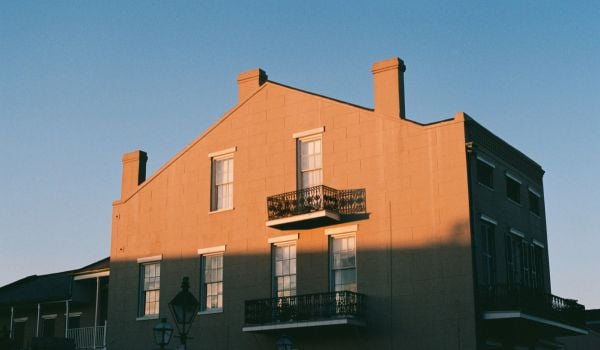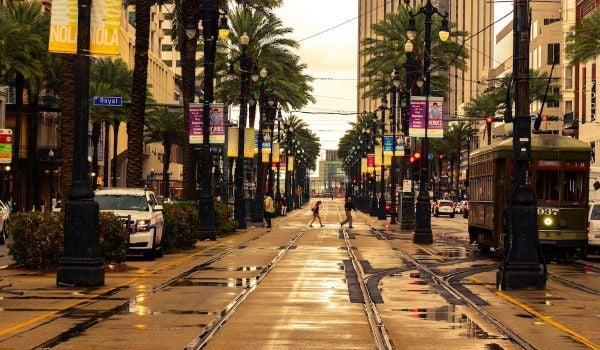Editor’s Note: Through its Writers in Motion program, the International Writing Program ( in Iowa City) brought together a group of eight international writers — poets, fiction writers, journalists, and one filmmaker — to tour a series of American cities, each selected for the writers to “read” as a variation on the theme of “Fall & Recovery.” The writers have spent the time on tour recording their observations and impressions of cities visited. In the next few weeks, Next American City will publish some sample works from this project.
The cemetery of New Orleans is what I think of this morning, a Sunday, standing outside Trinity Bible Church in Lafayette, Louisiana. I’m looking for some other place to shelter but all I see are fast food restaurants, a highway, and Trinity Bible’s electric signboard (“Find us on Facebook!”).
After nearly forty-five minutes, I had left the crisp, air-conditioned church where the Pastor was rowing powerfully through the stories of Moses, Joshua, the chosen people and their first step into the bounty of the promised land. “‘I will give you every piece of land you step upon,’” the Pastor had said, intoning the voice of God. “The country you are about to conquer: Syria, Iraq, Palestine, Egypt, Jordan, Lebanon, they’re not going to just pack up their homes and go. There’s going to be a war.” The Pastor’s face radiated triumphant sunshine. “God never reneges on a promise. It’s not about how good Moses is. It’s about the goodness of God. ‘I will give you every place where you set your foot.’ God promised the land.”
Soon after, I had stood up and left. It was clear to me that this House was not mine. Left to my own devices I might pick a fight (once again), and so I chose the wiser path: to stand amongst the shiny cars in the parking lot rather than inside the belly of the Old Testament. As I pushed through the double doors, the Pastor’s voice followed me via a sophisticated audio hook-up system: “To navigate properly, you have to keep your eyes on the Word.”
While waiting in the parking lot outside, it’s New Orleans that looms large in my mind. To protect them from the rising water, the dead in New Orleans are buried above ground; the concrete chambers stand in neat rows like a city of the dead. John Biguenet, who gave us this description, then directed our attention to the living—men and women rebuilding after the levees broke in 2005, and those without the means to come home.
“No American understands what happened here,” he said. “They don’t comprehend what it is to lose a city.” Immediately after the catastrophe, New Orleans was occupied by Humvees, military and mercenaries, including Blackwater. “Everywhere you went,” Biguenet says, “someone was holding a gun.” Terrified of looters, the powers that be set their sights on American citizens.
On August 29, 2005, the levees of New Orleans were breached in more than 50 locations, a catastrophic disaster caused by design failures “so obvious and fundamental” that the United States Army Corps of Engineers would finally, after months of about-facing, admit some culpability. In Biguenet’s play, Rising Water, a man and woman wake to find their bed surrounded by a foot of water. They climb upstairs, and then up to the attic, and finally through a vent—except that one of them, Sugar, can’t get all the way through. The play ends with Camille on the roof and Sugar unable to free himself, waiting for help “that does not come”. Rising Water has an innocence and ease which makes it all the more harrowing: how easy it is to be left behind. How easy it is to become detritus.
During the service this morning, the Pastor had spoken of how God parted the waters for Moses. “He stops the river upriver… what they’re left with is dry land. ‘I’m gonna give you the land.’ God has not changed. The promises of God have not changed.” The Pastor asks us to celebrate to the blessings of God’s constancy. “You got to believe those things.”
One of my fellow writers asked someone here why this catastrophe befell the residents of New Orleans. “That happens,” she said, “to people who put their faith in institutions other than God.”
In New Orleans, we had visited St. Bernard Parish and the Lower 9th Ward. We saw the houses not yet rebuilt six years after the levees broke; we saw abandoned hospitals, boarded up schools, and many, many empty lots. “This place,” the otherwise chirpy tour guide had said, as we passed through a collapsed neighborhood, “is not coming back.” Some homes still bore the insignia of a spraypainted X on their walls, marking the date military units arrived at the property, the existence or non-existence of toxic water, and the number of dead people and animals. Charlie Dobbs had entreated us: “If you see something that doesn’t make sense, ask why.”
Here is my question: how can there ever be a recovery if a place, a country, does not notice that there is anything to recover from?













